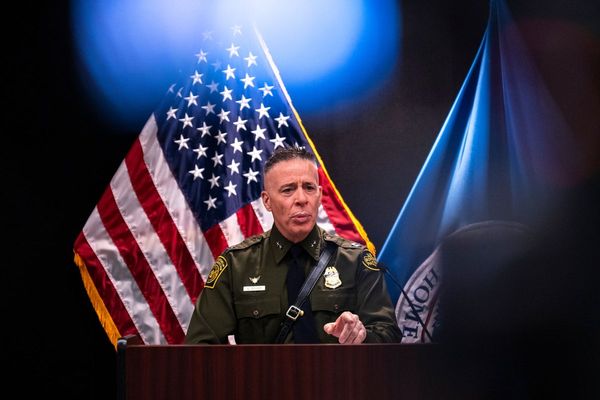
In Jesus College, Cambridge, an ornate marble monument to the college’s benefactor, Tobias Rustat, an influential 17th-century trafficker of enslaved Africans, towers above the chapel nave. In 2019, Jesus’s faculty and students decided the Rustat memorial should be relocated to a new space on campus as part of an exhibit on slavery and colonialism. But a few dons and an organised group of college alumni vehemently opposed their plan. The former Spectator editor, Charles Moore, described the relocation as an act of “cancellation” that would imperil “education, religion, built heritage, history and the rule of law”.
When faced with attempts to confront the causes of institutional racism in Britain, conservatives often resort to one key strategy. I call this strategy “ghostlining”. It is a technique long used by the ruling classes that frames public debates in ways that sideline the experience of the oppressed and silence calls for social justice. Ghostlining employs a one-two punch: first, disavow the ongoing effects of slavery, colonialism and racism; and second, play the benefactor and the victim at the same time. Ghostlining removes the experience of the oppressed from the focus of discussion, and instead reframes the debate around the interests of a ruling elite.
The backlash to the relocation of this ornate slab bore all the hallmarks of ghostlining: a small group, supported by reactionary high-profile opinion-makers, sought to deny the reality of institutional racism and then cast themselves as victims of zealous revisionism. For the foreseeable future, Rustat remains in place (a judge representing the Church of England, which possesses jurisdiction over Jesus’ chapel, rejected the relocation plan in March this year). But opinion continues to turn against that decision. In April, the Church of England’s racial justice commission lambasted the court’s ruling. Sonita Alleyne, the Barbados-born master of Jesus College, called the judge’s decision “offensive”.
Much like leaders at the National Trust and Glasgow University, who are trying to expose their institutions’ involvement in slavery, those who attempted to remove the memorial drew energy from the reparative justice movement. This movement recognises that racial inequalities are rooted in unfinished histories of colonial plunder and oppression. It seeks to remake our social institutions in order to end these persistent inequalities.
It may be strange to think of this all unfolding at a place like Jesus College, which forms part of an ancient and elite university. Yet many institutions that were beneficiaries of slavery and colonialism have become ground zero for a broader struggle over ongoing injustices that stem from Britain’s colonial past.
Indeed, Jesus College has set the bar by formally recognising the harm caused by its involvement in colonisation and enslavement, and has returned its Benin bronze cockerel to Nigeria’s National Commission for Museums and Monuments. Under the guidance of Alleyne, the college has also changed its outreach strategy to significantly increase the number of students admitted from diverse backgrounds. The college’s Legacy of Slavery Working Party is now drawing up plans to redress the psychological and emotional toll of slavery and the effects of institutional racism on its Black students, staff and faculty.
The right has already geared up to mount a counteroffensive. Looking back at the pattern of ghostlining that runs through Britain’s recent history shows that in the long term, this approach simply doesn’t work. The rightwing backlash to the visionary African Reparations Movement in the 1990s looked and sounded a lot like our present-day “culture war”. Led by the Labour MP Bernie Grant, this movement requested that the government redistribute wealth to African-descended communities and that British museums return plundered African artefacts to their rightful homes. It demanded significant investment in the arts, education and media to confront the psychological harm caused by racial discrimination against Black communities. Crucially, it demanded a radical remaking of education, health, housing and legal policies to abolish institutional racism.
When Anthony Gifford, a senior barrister who collaborated with this movement, raised the question of reparations in the House of Lords in 1996, he was met with a backlash. One peer suggested that the reparations movement made Britain the victim of a false narrative, and that the British government in fact played an honourable part in suppressing the slave trade. Another said that African people are “immensely forgiving” and that demands for reparations “go against” their nature.
It was the ghostlining playbook in action: deny history, perform as the hero and play the victim of false attacks. And it shut down discussion of reparations in the House of Lords (the topic has rarely been mentioned in the chamber since then). But attempts to ghostline such demands for progress only ensure these demands recur with renewed potency. In recent years, Lloyds of London and the Bank of England have issued apologies for their role in the atrocities of slavery; meanwhile, institutions such as the Horniman museum in London are developing plans to turn over looted cultural artefacts to African nations. These changes have happened because the tide of opinion is shifting. People are tired of ghostlining, and want institutions to confront racism at its root.
Jesus College is just one part of a larger movement of reparations struggles. In Britain, the newly established Black Equity Organisation focuses on changing policies and judicial processes that harm Black Britons. The Stop the Maangamizi campaign organises grassroots community mobilisation for reparations. There are growing demands to “decolonize the curriculum” in schools, colleges and universities, while a number of British universities, including Glasgow, Bristol and Manchester, are proposing concrete initiatives. Glasgow University in 2019 announced its intention to work with the University of the West Indies on reparative justice initiatives.
Bernie Grant, in his famous 1993 speech, Reparations or Bust, posed the big questions: “What sort of reparations do we need? Why do we need them? Are we entitled to it? People ask all these questions.” Reactionaries hoped then, as they do today, that these questions would be discredited in public discourse and avoided in policy debates. Yet their fury merely publicises and promotes the cause.
Kris Manjapra is professor of history at Tufts University and author of Black Ghost of Empire: The Long Death of Slavery and the Failure of Emancipation
Do you have an opinion on the issues raised in this article? If you would like to submit a letter of up to 300 words to be considered for publication, email it to us at guardian.letters@theguardian.com







